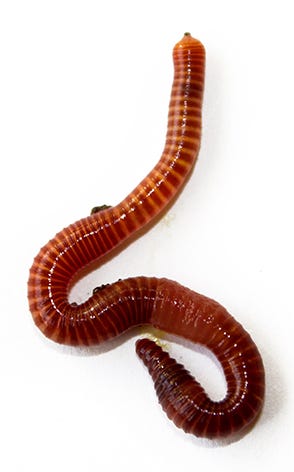Organic Composting with Red Wiggler Worms - Increase Your Garden's Development
Organic Composting with Red Wiggler Worms - Increase Your Garden's Development
Blog Article
Red Wiggler Worms Demystified: Unlocking the Keys of Vermiculture for Greener Living and Nutrient-Rich Dirt
In the realm of lasting techniques for enriching soil quality and promoting eco-conscious living, red wiggler worms play a pivotal yet commonly overlooked function. Red Wiggler Worms. Understanding the ins and outs of caring for these worms, maximizing their environment, and harnessing their castings can lead to a greener way of life and healthier dirt for plants to grow.
The Duty of Red Wiggler Worms
Red Wiggler worms play a crucial role in composting systems by efficiently damaging down raw material right into nutrient-rich spreadings. These ravenous eaters take in a variety of natural materials, such as kitchen scraps, yard waste, and paper products. As they feed, the worms' digestive system processes break down the raw material into a fine, dark, and nutrient-dense product known as worm castings or vermicompost.
The castings generated by Red Wiggler worms are extremely valuable for dirt health and plant development. They are rich in important nutrients like nitrogen, potassium, and phosphorus, which are crucial for supporting healthy plant growth. Additionally, worm spreadings contain beneficial microbes and enzymes that assist improve dirt framework, rise water retention, and boost nutrient uptake by plants.
Advantages of Vermicomposting

It enhances dirt structure, improves soil aeration, and enhances dirt wetness retention. Vermicompost additionally improves the soil with necessary nutrients like nitrogen, phosphorus, and potassium, promoting plant development and overall dirt fertility.
Additionally, vermicomposting supports sustainable gardening practices by providing a chemical-free and natural choice to artificial plant foods. Red Wiggler Worms. This eco-friendly strategy not only enriches the dirt but additionally assists minimize dependence on dangerous chemicals, promoting a greener and more sustainable way of gardening
Establishing a Worm Container
When establishing a worm bin for vermicomposting, appropriate arrangement is vital to ensure the success of the composting process. The first action in establishing up a worm container is choosing an appropriate container. This can be a plastic bin or wooden box that offers sufficient area for the worms to move and has proper drainage holes to stop waterlogging. Next off, a bed linen material such as shredded paper, cardboard, or coconut coir should be included to the container. This bed linen gives a comfy setting for the worms and aids keep dampness degrees.
After adding the bedding, introduce Click This Link the red wiggler worms to the bin. The worms ought to after that be provided with food scraps such as fruit and veggie peels, coffee premises, and eggshells.
Routinely check the Source moisture degrees and temperature in the worm bin to make sure optimal conditions for the worms. With correct setup and maintenance, the worm container will successfully transform natural waste right into nutrient-rich compost for your plants and yard.
Harvesting Worm Castings
To effectively collect nutrient-rich worm castings from your vermicomposting system, a methodical harvesting approach is important. When it comes time to gather the worm castings, there are a couple of essential steps to follow to make sure an effective process. To start with, quit adding fresh food scraps to one side of the worm bin for a number of weeks prior to harvesting. This urges the worms to migrate sideways with fresh bedding and food, making it much easier to dig the spreadings from the opposite.

Troubleshooting Common Issues
Identifying and resolving usual challenges that may emerge throughout the vermicomposting process is critical for maintaining a efficient and healthy and balanced worm container. Adding excess food scraps can lead to a buildup of dampness and level of acidity in the worm container, possibly hurting the internet worms. An additional problem is unpleasant odors originating from the worm container.
Furthermore, if the worm population is declining or the worms show up harmful, maybe as a result of ecological stress factors such as extreme temperatures or pH levels. Keeping an eye on these variables and making required changes is important for the wellness of the worms. By repairing these usual problems without delay, vermicomposters can ensure a smooth and effective vermicomposting procedure while preserving a growing worm population.

Verdict
In final thought, red wiggler worms play an important function in vermiculture by damaging down natural issue into nutrient-rich soil. The benefits of vermiculture include greener living and boosted dirt top quality. Establishing up a worm container is important for successful vermiculture, and harvesting worm spreadings offers important garden compost for gardening. By understanding and fixing usual issues, individuals can unlock the tricks of vermiculture for sustainable living and much healthier soil.
As they feed, the worms' digestive processes damage down the organic issue right into a penalty, dark, and nutrient-dense material recognized as worm spreadings or vermicompost.
The castings produced by Red Wiggler worms are extremely advantageous for soil health and wellness and plant development. Including excess food scraps can lead to an accumulation of dampness and level of acidity in the worm container, potentially harming the worms.Additionally, if the worm population is declining or the worms appear unhealthy, it could be due to ecological stress factors such as extreme temperatures or pH levels. Establishing up a worm bin is important for effective vermiculture, and collecting worm castings supplies important compost for horticulture.
Report this page